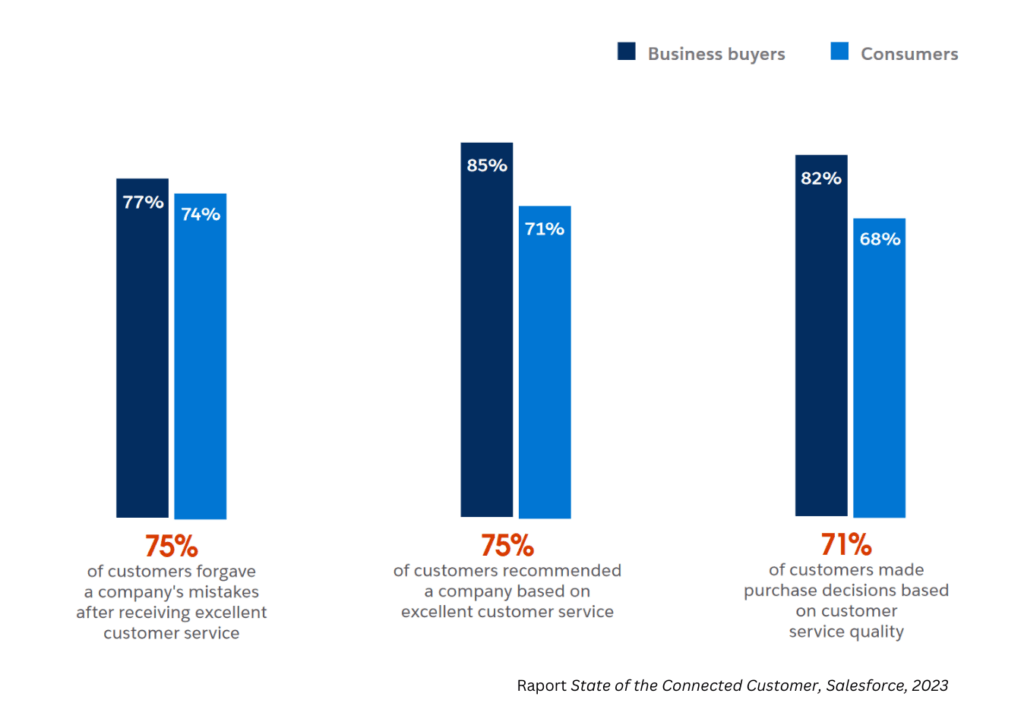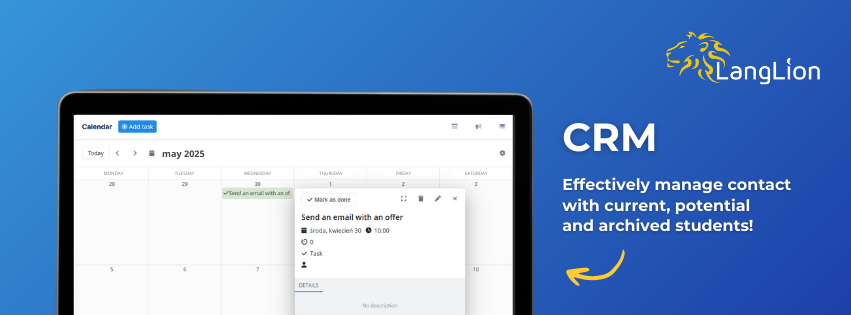
Customer service in a language school is a topic that continues to gain importance in today’s dynamic environment. Clients – both students and parents – expect not only high-quality services but also an exceptional experience at every stage of cooperation. Learn how to build lasting relationships, meet customer expectations, and stand out in the market.
What will you find in this article?
- What is customer service in a language school?
- Why is customer service crucial in language schools?
- Customer service challenges in a language school
- How to measure customer satisfaction?
- Key elements of customer service in a language school
- Summary – effective customer service in a language school
What is customer service in a language school?
Customer service is the process of supporting users of products or services in a way that resolves their problems and builds a positive experience with the brand. It’s not only about responding to inquiries but also about proactive actions. A key element of customer service is meeting expectations and ensuring satisfaction, which fosters the building of long-term relationships.
In the context of language schools, customer service means something more – it’s about nurturing relationships with students that turn satisfied clients into brand ambassadors. Such clients recommend the school to friends and acquaintances, which translates into a significant increase in the customer base.
Why is customer service crucial in language schools?
According to Salesforce research, as much as 75% of customers are willing to recommend a company that provides excellent service. Moreover, 47% will pay more for a service if it comes with a higher standard of service.
In language schools, where competition is high and educational products are often similar, the quality of the relationship with the client can be a key success factor.

Customer service challenges in a language school
Customer service does not always proceed smoothly. In language schools, we often encounter the following challenges:
Unrealistic customer expectations
Customers may expect to achieve very ambitious goals in a short period of time, such as moving from level A1 to B1 in just a few weeks. The school’s role is to balance these expectations by presenting realistic time frames and possibilities for progress. It’s important not to discourage the student, but at the same time, avoid promising the impossible.
Maintaining a balance between the interests of the customer and the school
The popular saying „the customer is always right” doesn’t always hold true nowadays. Striving for maximum customer satisfaction shouldn’t come at the expense of the school, such as by promising services that exceed the company’s capabilities.
Managing conflicts and difficult situations
Examples include payment arrears or situations where a student is dissatisfied with the instructor. It’s crucial to maintain a professional tone, propose solutions, and quickly respond to problematic situations.
PS. Read our post and find out what to do if a student won’t pay!
How to measure customer satisfaction?
Assessing the level of customer satisfaction is an essential element of managing a language school. There are four key methods:
Net Promoter Score (NPS)
NPS is a simple indicator measuring customer loyalty based on one question: „How likely are you to recommend our services to a friend?” Results are divided into three groups of customers: promoters, passives, and critics. Regular NPS surveys allow tracking customer satisfaction over time.
Phone or in-person interviews with customers
Direct conversations are more time-consuming but provide detailed information and help understand customers’ needs and expectations. They can be conducted by instructors or a dedicated customer service team.
Analysis of opinions on social media and google
Online reviews are an invaluable source of information. Regular monitoring of reviews allows not only recognizing strengths but also identifying areas for improvement.
CRM tools
CRM (Customer Relationship Management) systems are invaluable support in managing customer relationships.
They allow for:
- Collecting detailed data on students and parents.
- Automating notifications, payment reminders, or satisfaction surveys.
- Tracking communication history, ensuring consistency during conversations regardless of who is assisting the customer.
Practical example: If a child’s parent calls with a question, a well-prepared employee can say: „Good morning, I see you’re calling about Jane. How can I help?” This level of preparation builds trust and positively impacts the school’s perception.
LangLion is a language school management platform, offering a CRM module. It integrates with the system and allows for managing contacts without the need for external tools. Read more about the CRM Module in LangLion!

Key elements of customer service in a language school
1. Personalization and individual approach
Every client is different, which is why personalization is one of the foundations of effective service. It is worthwhile to know the preferences of your students and their parents, such as the form of classes (online or in-person), educational expectations, or preferred method of communication.
2. Customer Journey Map
Creating a customer journey map allows you to identify key touchpoints between the client and your school—from the first contact to the end of the course. It’s beneficial to analyze what emotions and impressions accompany the client at each stage and look for ways to improve these experiences.
3. Golden rules of communication
Transparent, polite, and appropriately tailored communication is fundamental. Clients appreciate quick responses to inquiries, clear terms of cooperation, and a proactive approach.
Summary – effective customer service in a language school
Customer service in a language school is not only about responding to the needs of students but also about proactive actions that build trust and loyalty. Personalization, the use of tools like CRM, and creating unique experiences are investments that benefit both the clients and your school.
If you want to learn more about the CRM module and the LangLion platform, book a free LangLion Platform presentation!
